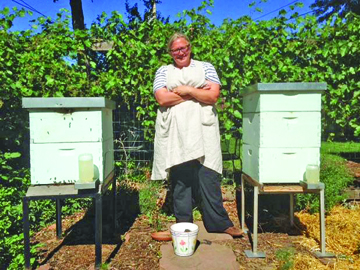
by Mark Smiley | Jun 28, 2018 | Travel
by Ruthy Wexler

Beekeeper: Katherine Cornwell at home with her two hives of bees. Now a planning consultant, she worked for years as city planner for Seattle; Madison, Wisconsin; and — for eight years — the city of Denver. Madison, she says, “is the most like a bee colony. Itsdemocratic process was sometimes irritating as hell … If they did not want to do something, that city could not be moved. But when an idea was good, action was swift.”
While Denver continues to expand, the local bee population goes about its own complicated business — and a growing number of beekeepers are available to help when the two paths cross. On a recent sunny Friday, a large swarm threatened the pleasure of outdoor diners at Proto’s Pizza and so the construction crew across 15th Street called Katherine Cornwell, who is registered with the Swarm Hotline — and, it turns out, knows quite a bit about Denver’s expansion.
The small crowd attracted by Cornwell’s actions — gently scooping bees from the tree they’d settled on into an ordinary packing box atop her car — wondered how on earth she’d get the entire swarm into that box.
“See those bees near the hole of the box?” Cornwell explained. “See how they’re putting their butts in the air and fanning their wings? They’re letting the other bees know that the queen is inside.”
Fascinating And Wonderful
Katherine Cornwell didn’t know how much she would have in common with bees when she began studying them 10 years ago. All she knew was, she’d fallen in love.
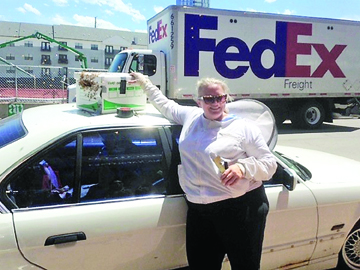
Captured: Katherine Cornwell outside Proto’s Pizza on 15th Street, where she captured the swarm and explained to onlookers how she did it. The key was making sure the queen got inside the box, so other bees would follow.
“I was watching TV, which I rarely do,” she recalls. “This Haagen-Dazs commercial comes on — bees flying over a field toward a big succulent flower … then the screen goes blank. Words appear, ‘The honeybees are dying’ — and I start sobbing.
“I cannot explain to this day why it moved me so much. I was determined to learn more. I studied with Corwin Bell in Eldorado Springs — which ranks as one of the most lovely experiences of my life. I learned how fascinating and wonderful bees are. And I realized that bee colonies embodied principles I’d been thinking about in my own field, city planning.”
Bees And People
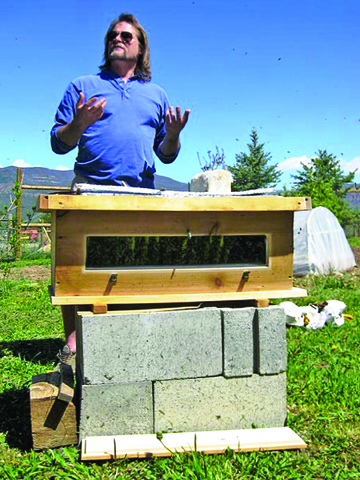
Expert: Corwin Bell, whom Cornwell studied under, teaches Bee Guardianship courses that show how bees, humankind and the natural world are connected and promote alternatives to conventional beekeeping. A computer animator and filmmaker, Bell has filmed hours of footage of honeybees. He travels the world to witness beekeeping under every condition imaginable.
As city planner for Denver from 2000-2008, Cornwell was inspired by her boss, the late Jennifer Moulton. “All around the city, wonderful things were happening. Civic Center, Stapleton, Central Platte Valley, Lower Downtown Denver …. Jennifer had such vision about the future, while preserving the past …”
Cornwell, who was co-author and project manager for Denver’s University Park Plan; East and West Colfax; the Main Street Zone District, and co-author of Blueprint Denver, now feels frustrated that current projects — like the widening of I-70 — do not take urban and environmental principles into account.
“As a city planner, I can tell you this project is counter intuitive. Widening roads in the urban core makes congestion worse …
“Development is now crafted behind closed doors,” Cornwell observes. “The so-called experts are just lobbyists, lawyers and spineless bureaucrats.
“And here’s where this relates to beekeeping. Bees and people are both very  complex. Both need communication, both need communities … But developers don’t trust citizens. Politicians don’t ask what citizens want. So wealthy individuals with high stakes interests are superimposing their vision on the people.
complex. Both need communication, both need communities … But developers don’t trust citizens. Politicians don’t ask what citizens want. So wealthy individuals with high stakes interests are superimposing their vision on the people.
“It’s not just those in charge. Citizens are not participating. But all bees participate in their community.”
Participatory Democracy!
“Bees have different roles, which they perform meticulously,” Cornwell explains. “The sentinel bee protects the hive, the nurse bee raises the baby bees, the scout goes out to find new food and new hives …
“When a scout finds a new potential hive, she doesn’t order everyone to go there. She comes back and communicates through a waggle motion danced in a figure eight pattern. Where she stops on the figure eight and how long she waggles indicates direction and distance of the new find. The number of times she repeats the dance correlates to the find’s degree of awesomeness, persuading other bees to check it out …
“If they agree, they’ll waggle dance about it too, until the whole colony decides as a group to go there.
“If that’s not participatory democracy, I don’t know what is!
“Denver,” she says, “is not behaving like a bee colony.”
Back To The Box
After a good hour — and a minor catastrophe, where the box’s lid blew off and Cornwell had to start all over! — the hive of bees all seemed to be collected and she entertained a few more questions.
“How did that swarm end up here?”
“Sometimes hives are disturbed by construction,” Cornwell said. “Which might have happened here. But usually they swarm because a new queen was born. The hive splits and the old queen leaves with half the colony to find a new home.”
“How do you get the queen inside the box?”
Cornwell smiled. “Providence, good luck, or chance. Usually it’s pretty easy. If the bees are just hanging from a small branch, I’ll clip it so the whole thing falls into the box.
“Today, the bees were clumped on a tree trunk. So I gently scooped them a bit at a time until I saw them acting like I had the queen, you know, fanning their butts in the air.”
Mission accomplished, Cornwell put the box inside her trunk and began the drive to an organic farm in Boulder where the bees will take up residence in a hive box with million-dollar views of the Flatirons.
For more information on swarm removal or beekeeping visit coloradobeekeepers.org or call 1-844-779-2337.

by Mark Smiley | Jun 24, 2018 | Editorials

Plato
In the 4th century BC, Plato wrote the highly influential treatise The Republic. Plato was no fan of democracy — either direct democracy where every eligible citizen would have the opportunity to vote on legislation or representative democracy where eligible citizens would vote on representatives who would in turn vote on legislation. He postulated that the best system would involve rule by “philosopher kings.”
He envisioned that a special class of people be given a specific education, available to few, which would include men and women as philosopher kings and queens. Out of this collective elite only the most virtuous and capable would become rulers. They would live simply and rule benevolently for the common good.
While his treatise has been widely read and praised for over two millennium no one has actually sought to institute rule by “philosopher kings,” at least until now. Here in Colorado we have begun to adopt a form of rule by philosopher kings that would have thrilled Plato.
Federal District Court judges in many ways resemble Plato’s ideal. They have a very specialized education (law) that is available to only a few. They live simply as federal court judges presently make only $169,300 annually. Like kings they are appointed for a life tenure. Among this class of philosophers (i.e. lawyers) federal district court judges are chosen by the President of the United States with the advice and consent of the US Senate for their purported knowledge and virtuousness.
In Colorado we have seven regular philosopher kings (with one present vacancy) and five senior philosopher kings. They are almost evenly divided among Democrats and Republicans and include both men and women as desired by Plato.
To placate the Colorado masses, we have both pretend direct and pretend representative democracy but that is largely window dressing. Any time the masses do something egregiously stupid any of our philosopher kings can change it for the good of all of us.
Back in 2006 the Colorado hoi polloi in their atavistic ignorance and bigotry voted to have “their” state constitution define marriage as union of a “man” and a “woman.” Luckily philosopher king Judge Raymond P. Moore struck down that ridiculous bit of direct democracy as his legal wisdom was recognized as being correct in the U.S. Supreme Court decision of Obergefell v. Hodges.
Do not think that a dutiful philosopher king like Raymond Moore bothers himself with simply hotly contested issues. Recently in the case of Holland v. Williams he went after another bit of voter approved idiocy concerning campaign state finance reforms. In his wit and wisdom Moore decided he didn’t like the fact that private attorney generals (everyday citizens) could just bring claims against candidates or their campaigns without the claims being vetted by someone so he struck that provision down as unconstitutional.
It was the perfect case for a modern philosopher king where the plaintiff, Tammy Holland, and the defendant, Secretary of State Wayne Williams, both adamantly disliked the campaign finance laws in Colorado and so neither argued for it. Moore refused other parties who do support the campaign finance laws from entering into the case. What is so cool about the case is that since both plaintiff and defendant don’t like the law neither will appeal Moore’s decision to the Court of Appeals for the 10th Circuit so that Moore’s ruling can’t and will not be reviewed by anyone.
The best thing about being a ph
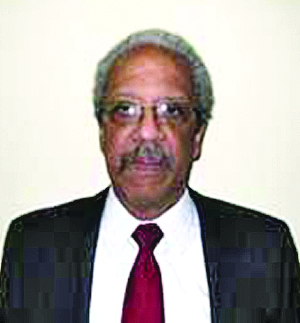
Judge Moore
ilosopher king like Moore is you can be as lazy as you want to be at times. Moore was too special to say how you vet the campaign finance complaints, just somebody should do it.
Secretary of State Wayne Williams is widely viewed as an establishment Republican hack who protects at any cost other establishment Republicans like Bob Beauprez and Walker Stapleton. He has now declared that he will simply do all the vetting of any complaints himself. Obviously, the voters of Colorado did not want politicians like Williams being the gatekeeper, but who cares what the voters want. The philosopher king can’t be bothered to decide and in in his absence the politically avarice Williams fills the void.
Other Colorado federal judge philosopher kings have also been active in their benevolent rule. In order to be placed on the primary ballot in Colorado, Colorado statutes provide one of the ways to obtain a sufficient number of signatures is to have petition gatherers who are Colorado residents. Six-term Republican Congressman Doug Lamborn could not be bothered with getting Colorado residents for petition gatherers and he was in danger of not making the ballot. First, he went to state court and lost all the way up, including the Colorado Supreme Court.
Luckily Federal District Court Ju
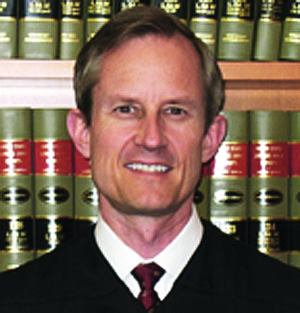
Judge Brimmer
dge Phillip Brimmer somehow decided that having Colorado residents collect signatures was a stupid idea that he didn’t like so voilá, he declared it unconstitutional and the Republican Congressman was back on the ballot.
Federal District Court Judge William J. Martinez recently decided he didn’t like parts of Amendment 41 which made it harder to change the state constitution by voters. He simply found significant portions of the constitution amendment to be unconstitutional.
These are but a few of many wonderful decisions by Colorado’s federal district court judges that make it clear dem
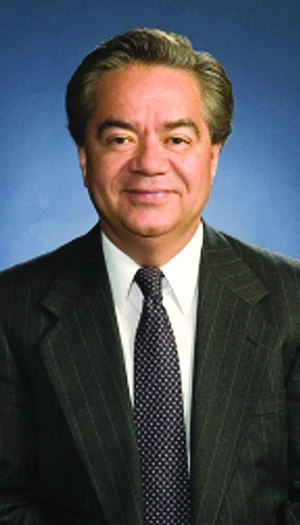
Judge Martinez
ocracy is largely a thing of the past here in Colorado.
Mark Twain sagaciously declared: “If voting made any difference they wouldn’t let us do it.” We here in Colorado can vote and approve directly or through the legislative process anything we want, but it really doesn’t matter. We have evolved into a form of Plato’s ideal of rule by philosopher kings. Hopefully our experiment will continually be improved upon and we can dispense with the cost and annoyance of the pretend direct and representative democracy. We can then just directly petition our philosopher king federal district court judges to direct all aspects of our lives. It has taken almost 2,500 years to recognize that we need to live under the rule of philosopher kings as outlined by Plato but we here in Colorado have finally gotten it right and it will only get better and better over time.

by Mark Smiley | May 25, 2018 | Glendale City News
by John Arthur
Writer for and on behalf of the City of Glendale

GLENDALE, CO – MAY 21: Saint Marys vs Lindenwood during the USA Rugby College 7’s National Championships at Infinity Park on May 21, 2017 in Glendale, Colorado. (Photo by Seth McConnell)

GLENDALE, CO – JUNE 3: Life West vs Raleigh at Infinity Park on June 3, 2017 in Glendale, Colorado. (Photo by Seth McConnell)
Tournament play has long been a staple at Infinity Park, the Glendale venue hosting some of the largest and most prestigious competitions in the country. Known as RugbyTown USA, Glendale has been a hotbed of national rugby activity for more than a decade. Starting in mid-May, tournaments returned again to the nation’s first rugby-specific stadium, kicking off with the USA Rugby Collegiate 7s National Championships. June 2-3 will see the USA Rugby Club National Championship competition, and August 24-26 Infinity Park’s signature annual event will again be in Glendale: RugbyTown 7s.
An increasingly popular rugby discipline, participation in Sevens play skyrocketed following the 2009 announcement of its return to the 2016 Olympic Games. A variant of rugby union play, Rugby Sevens is a faster-paced version of the sport, with smaller teams and considerably shorter game duration. Instead of the usual 15-player teams playing 40-minute halves, Rugby Sevens features seven players to a team and seven minute halves. The abbreviated game play places an emphasis on conditioning and endurance, and means that an entire tournament can be played over the course of a weekend.
In mid-May, Infinity Park hosted the USA Rugby Collegiate Sevens National Championships for the second year running. Founded in 2011, the tournament has consistently drawn the nation’s best young talent, producing competition at the highest level. 2018 saw the return of reigning Division I Men’s and Women’s sides from Lindenwood University, traveling from St. Louis, Missouri, to compete. Friday, May 18, through Sunday, May 20, 2018, more than 40 teams from colleges across the nation

GLENDALE, CO – AUGUST 27: Ramblin Jesters vs Fiji (Savu Water) during RugbyTown 7’s at Infinity Park on August 27, 2017 in Glendale, Colorado. (Photo by Seth McConnell)
gathered to vie for National titles in Men’s and Women’s Division I and II play. With teams from Arkansas to Arizona, California to North Carolina, it was truly a national gathering.
June 2-3 will see the next round of tournament action at Infinity Park, as the 2018 USA Rugby Emirates Airline Club National Championships come to town. Featuring club finals for Women’s Division I and II, as well as for Men’s Division I, II, and III teams, the tournament will decide the top amateur rugby talent in the United States. The USA Rugby Club structure divides the nation into two conferences: East and West. Within each conference are four distinct competitive regions (Pacific North, Pacific South, Frontier, and Red River in the West, and Atlantic North, Mid-Atlantic, Midwest, and Southern in the East). The winners of each region advances to the semifinals, which took place May 19-20. The winners of those matches move on to compete at Infinity Park in June.
Every year, summer rugby in Glendale concludes with a bang: Infinity Park’s signature annual event, the RugbyTown 7s (RT7s) Tournament. Attracting scores of teams from every corner of the globe, as well as representative teams from every branch of the U.S. Military, RT7s provides Glendale spectators a taste of rugby’s universal appeal and expansive international presence. Last year’s tournament attracted thousands over three days of play, and with the emergence of professional rugby in 2018 stoking the U.S. fan base, promises to be larger still this August. Alongside the fast-paced competition, attendees will get to enjoy Glendale’s Bruises and Brews Beer Festival, a recent tradition that pairs Colorado’s craft brewers and distillers with the sport of rugby.
Augmenting the already exciting professional debut of the Glendale Raptors, tournaments at Infinity Park offer rugby fans another outlet for exploring the sport — enjoying top-tier play at the collegiate, club, and international level. In addition to the tournaments scheduled this year, fans can look forward to the Major League Rugby semi-finals, a double-header that will take place at Infinity Park on June 30. Long the epicenter of rugby in the United States, Glendale’s professional, club, and tournament play means that in 2018, more than ever before, the city is truly RugbyTown USA.

by Mark Smiley | May 25, 2018 | General Featured
Glendale Barnes & Noble Hosts Signing On June 16
 The stories of three Colorado authors who found love in midlife when they least expected it are included in Chicken Soup for the Soul: The Miracle of Love that will be available in bookstores and online June 5. Cindy Charlton of Lakewood, Lisa Marlin of Denver, and Susan Mathis of Colorado Springs, are among the 101 authors featured in the latest release from the popular book series.
The stories of three Colorado authors who found love in midlife when they least expected it are included in Chicken Soup for the Soul: The Miracle of Love that will be available in bookstores and online June 5. Cindy Charlton of Lakewood, Lisa Marlin of Denver, and Susan Mathis of Colorado Springs, are among the 101 authors featured in the latest release from the popular book series.
The new book is a compilation of true stories from women and men who have written openly about their adventures in dating and romance, proposals and weddings, lasting marriages and second chances at finding love.
Charlton had resigned herself to being content without a relationship. Her story “Romance Therapy” is about reconnecting with the physical therapist she’d met 20 years ago when she was adjusting to life as a triple amputee. Their midlife lunch date evolved into a new relationship. “When it happened, I couldn’t believe that this was my life,” she said. “When I gave him the story to read, before I even submitted it, he was a bit in awe I think.”
This is Charlton’s fifth time to be published in Chicken Soup for the Soul. “I wanted to share this unbelievable lov
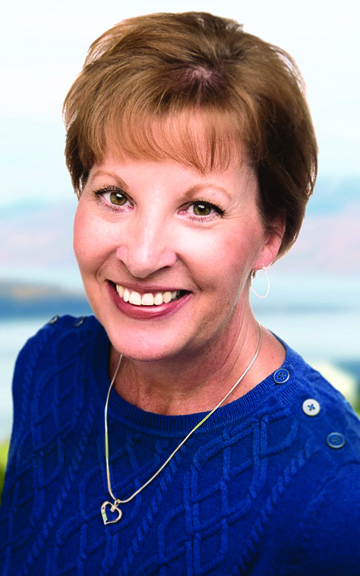
Susan Mathis
e story with the masses,” she said.
Marlin said she’s enjoyed Chicken Soup for the Soul books for years and decided to see what it would be like to write for them. Scanning the lists of topics on their website last year, this one caught her eye. “I’d already written a love story as an anniversary gift to my partner about how I remember us meeting as teens but not getting together until 30 years later,” she said. “So I polished it up and sent it in.”
In March, she got word that her story “Haven’t We Met Somewhere Before?” had been selected. “After I got over the shock, it occurred to me that I should ask my partner if it would be okay to share our story with the world,” Marlin said. He did not hesitate when he told her, “Of course. We’re a good story.”
Mathis said that she too has always liked reading the inspirational books and was in fact published two years ago in Chicken Soup for the Soul: Spirit of America. For this new book she said, “I wanted to share our love story since it’s a story of commitment, hope and enduring love. In a world that throws away relationships far too easily, ‘for better or worse, in sickness and health’ is a much-needed vow.”
Mathis’ story “Live Without Regret” is about how they faced her husband’s health issues before and after they married. The couple has also co-authored relationship books, including The ReMarriage Adventure. Just days before his birthday in May, she surprised her husband with an advanced copy of the new book. “He, too, is happy to be part of sharing our ‘miracle of love,’” she said.
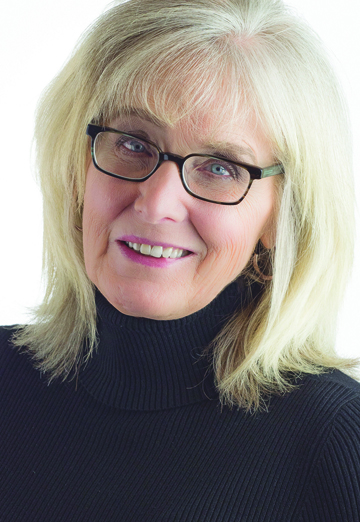
Lisa Marlin
Before the authors knew they had been selected, Amy Newmark, publisher and editor-in-chief of the Chicken Soup for the Soul book series, knew their stories would resonate with readers. “People tell us that they want to be able to offer hope,” she said. “They want to share this book with a 25-year-old daughter to encourage her as she waits for love or to let a widow or divorcee know that second chances at love are possible.”
With more than 150 books to her credit since she and her husband Bill Rouhana acquired Chicken Soup for the Soul in 2008, Newmark has a sense for what readers want. Sometimes she discovers that by what writers are submitting. That’s how this most recent book came about when a call for submissions for the topics “Step Outside Your Comfort Zone” and “Miracles and More” garnered a lot of love stories that fit into those categories but seemed to need a place of their own.
“As I got stories for the other books, there were all these fascinating ways people wrote that they found love,” Newmark said, adding that she approached her publishing team who all agreed when she suggested they do a book about finding love.
As with all Chicken Soup for the Soul books, this one delivers a message of hope. In this book, that hope comes from real life stories that prove love is possible at any age and often in the most unexpected ways because, after all, that’s the miracle of love.
Marlin and Mathis will sign copies of the book at Barnes & Noble, 960 S. Colorado Blvd., in Glendale, on Saturday, June 16, from 1:30 to 3:30 p.m. Charlton is not available for the event.

by Mark Smiley | May 25, 2018 | Travel
City Forces Residents Into Mediation With Developer
by Mark Smiley

In the April 2018 edition, the Chronicle reported on a proposed condominium development called Green Flats that would be located on Holly Street, between Cedar and Alameda, south of the strip of businesses that includes Novo Coffee and Park Burger. The proposed project would have 27 condominium units, 40 uncovered parking spaces in back, a 20-foot setback from Holly street, and stand 35 feet high, seven feet higher than the Park Burger business complex.
On April 4, 2018, the overwhelming pro developer Denver Planning Board (an 11-person board appointed by Mayor Michael Hancock) entertained the application for this three-story condominium project. Residents from the neighborhood filed into the Planning Board meeting to speak in opposition.
All told, 17 people went on the record, some for, but mostly against the project. In a stunning turn of events, the Planning Board voted to deny the application finding that the “applicable review criteria have not been met.” The vote cast had six in favor, one opposed, and one abstention.
Residents who opposed this project had little time to celebrate . . . Most cities in Colorado prevent a similar proposal from being considered for at least a year, but not Denver. Instead the city forces the successful residents into immediate mediation with the developer with the city choosing a mediator who some claim leans toward being pro developer.
“The city is really pushing to have this developed,” said Denver realtor Denice Reich. “They are trading affordable housing for the myth replacement of affordable housing.”
Since the April 4 Planning Board meeting, the developer Jason Lewiston, president of Greenius LLC and the applicant representing the homeowners seeking the sale of their property Anna Dewitt, have submitted a revised application.
They are asking that all three parcels receive the same Urban Edge multi-unit 2.5 story designation that the current condos have only “with waivers.” The new application doesn’t include new plans, but now says there will be 25 units instead of 27. It is suspected by some opponents that the Planning Board’s staff recommended the amended application indicating it might be something the City Council finds acceptable. Critics charge that there is virtually no development the city doesn’t find acceptable.
The “mediation” was held on May 7, 2018, at Augustana Lutheran Church. According to some of the 24 attendees the mediator’s only task appeared to be to get a development that Lewiston would approve. The mediator made a list of questions and three residents were chosen to sit down with the developer and the applicants at a later date.
If you wish to follow what’s happening in this rapidly developing story, visit www. glendalecherrycreek.com or follow the Chronicle on Twitter, Facebook at @GCCChronicle.
Plan Denied: The initial proposed site development for a 27-unit condominium project on Holly Street was denied by the Denver Planning Board on April 4. On May 7, the city forced a pro developer on residents opposing the project.
Leading The Opposition: Denver Realtor Denice Reich has been opposed to the development on Holly Street stating that “they are trading affordable housing for the myth replacement of affordable housing.”

by Mark Smiley | May 25, 2018 | Editorials
The Colorado primary season will come to a dramatic conclusion on the evening of June 26, 2018. It has already been a topsy turvy primary season. The leading Republican candidate for governor, Walker Stapleton, had to abandon his petition drive after already submitting his petitions to the Secretary of State for fear that a large number of the signatures would be thrown out for using unqualified petition gatherers. Instead he went the Assembly route and only beat second place fi
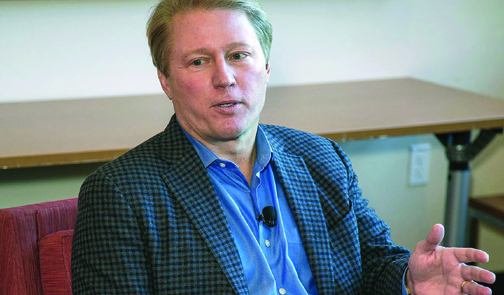
Kent Thiry
nisher Greg Lopez, whose only claim to fame was being the young Mayor of Parker 30 years ago, by less than 10 points. Lopez was virtually an unknown individual at the beginning of the process. Lopez does not have any personal wealth and raised little or no money prior to the State Assembly, but he traveled all 64 counties of Colorado and gave a rousing speech at the Assembly.
In addition, six-term Congressman Doug Lamborn of El Paso County was thrown off the ballot by the Colorado Supreme Court for ineligible petition gatherers, only to have that decision overturned by Federal District Court Judge Philip A. Brimmer.
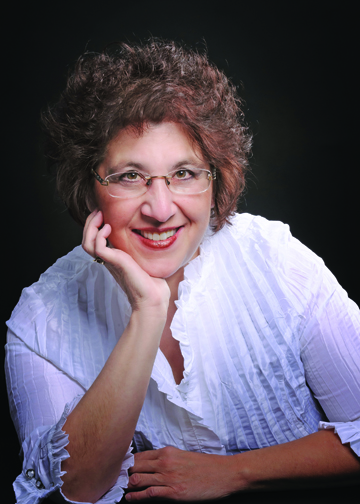
Karen Kataline
On the Democratic side the three gubernatorial candidates — Jared Polis, Cary Kennedy and Mike Johnston — have raised and/or personally contributed record breaking amounts of money for their campaigns. Johnston hit a fountain of cash from anti-gun Bloomberg groups while Kennedy is being generously funded by Colorado’s public employee unions. Polis is perhaps the richest man ever to run for Colorado governor and is strongly backed by Bernie Sanders progressives.
The Democratic National Congressional Committee (DNCC) has recruited moderate “blue dog” candidates across the country in an attempt to win back the House from the Republicans. The DNCC has even run smear campaigns in Texas and other states against Bernie Sanders progressives in favor of their establishment candidates. In Colorado, progressive Levi Tillemann, a candidate for the Sixth Congressional District now held by Republican Mike Coffman, recorded Steny Hoyer, the second in command for Congressional Democrats, demanding he withdraw his candidacy in favor of DNCC candidate Jason Crowe, a lawyer who doesn’t even live in District Six.
But all of that brouhaha will be nothing compared to election night when who will take the primaries for the respective parties is absolutely unknown. This conundrum is due to three factors. First is Proposition 108, approved by the voters by a close margin in 2016. It provides that unaffiliated voters will get both a Democratic and a Republican ballot and they can choose one or the other. Prop 108 was the brainchild of disreputable and sleazy businessman Kent Thiry who spent millions to get it passed and desperately wanted to be Colorado’s governor in 2018. Thiry knows that the Democratic Party wanted nothing to do with him but he had calculated that a highly diluted Republican Party, with the help of unaffiliated voters, could be persuaded to make him its candidate if he spent enough money. Unfortunately, the best laid plans of mice and men oft go awry. Thiry’s cutthroat and unprincipled business tactics in running DaVita, a kidney dialysis company, were devastatingly exposed by television comedian John Oliver in a segment of “Last Week Tonight with John Oliver” on HBO.
While Thiry’s political ambitions lay in tatters at least for 2018, the state’s voters are left with Proposition 108. Its intent was to allow middle of the road moderates, particularly Republicans, to prevail in primaries. Will it have that effect, no one knows. It will allow one party to play in the other’s primary. On the Republican side so-called “strategic voting” has become all the rage for the upcoming primary. Operation Chaos Colorado has been promoted by radio show host Karen Kataline who is urging Republicans to unaffiliate, get both ballots and vote for the weakest Democratic candidates. For example, most Republican strategists believe Jared Polis would be a far weaker candidate than Cary Kennedy in the day of the #MeToo Movement. Kataline points out that the Democrats have been playing this game for a long time, as demonstrated by the financial and other support that Democrats gave to Dan Maes in 2010, over a much more electable Scott McInnis.
Prop 108, in combination with the all mail-in ballot election, makes it almost impossible to determine who will vote and in what primary. Moreover, establishment candidates of both parties once had an enormous advantage due to the fact that The Denver Post seldom promoted or even covered lesser known candidates. The slow demise of The Denver Post, which no longer even has an editorial opinion writer, means that the lesser known candidates may have a greater chance of winning than ever before.
So get the popcorn out and watch the results roll in on the night of June 26. There may be some amazing upsets.




 complex. Both need communication, both need communities … But developers don’t trust citizens. Politicians don’t ask what citizens want. So wealthy individuals with high stakes interests are superimposing their vision on the people.
complex. Both need communication, both need communities … But developers don’t trust citizens. Politicians don’t ask what citizens want. So wealthy individuals with high stakes interests are superimposing their vision on the people.















